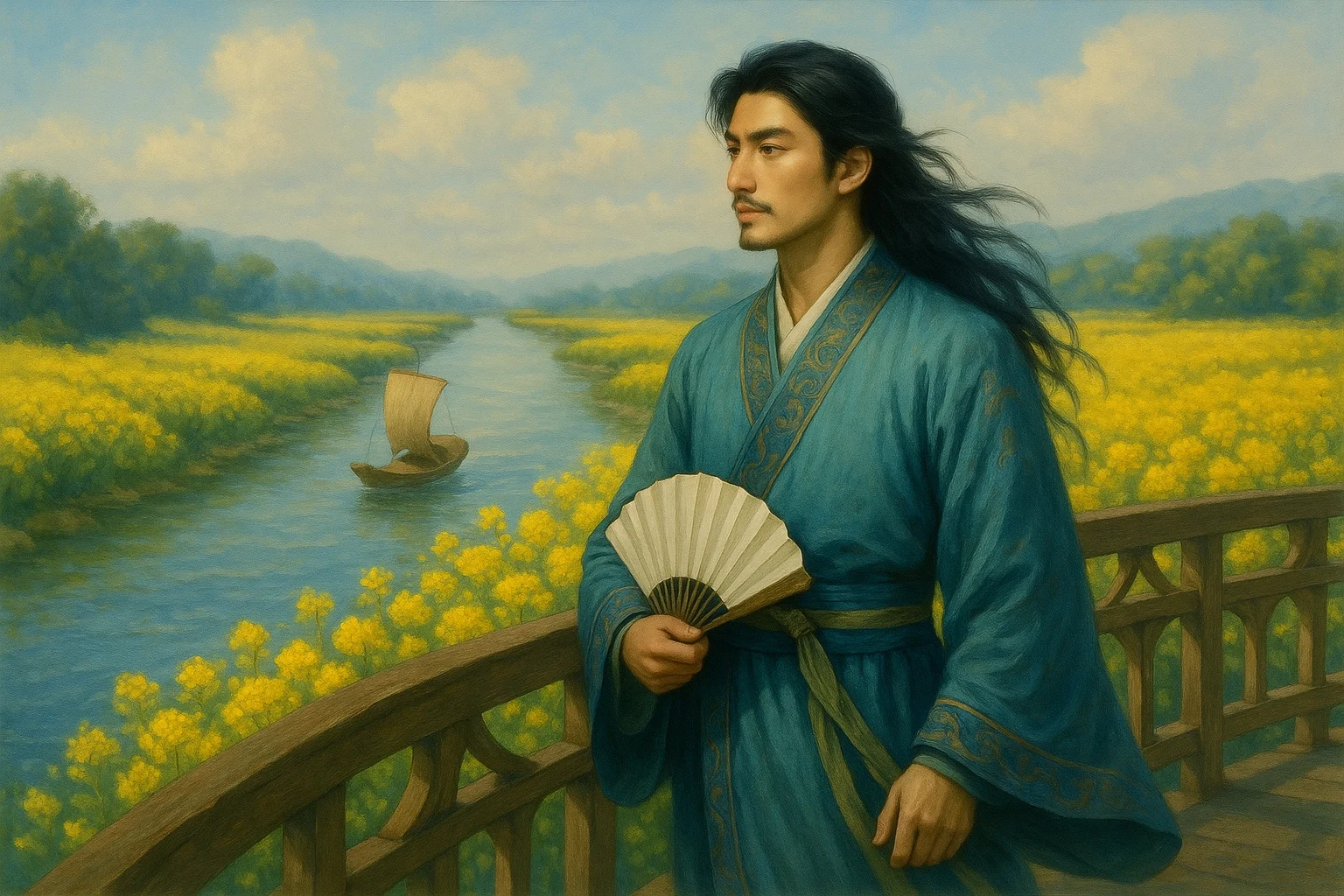From war-torn riverside towns we fled,
Now meeting—joy and shock both spread.
After so many years apart,
I ask of childhood names, my heart
Turns wistful with each cup we drain,
Discussing texts, young scholars pain.
I know your scrolls will brim so bright,
They’ll make Jiangcheng’s paper dear overnight.
Original Poem
「喜逢妻弟郑损因送入京」
崔峒
乱后自江城,相逢喜复惊。
为经多载别,欲问小时名。
对酒悲前事,论文畏后生。
遥知盈卷轴,纸贵在江城。
Interpretation
Composed after the An Lushan Rebellion when Cui Dong encountered his long-lost brother-in-law Zheng Sun by chance in River City, this poem captures the complex emotions of their impending farewell as Zheng prepares to depart for the capital. Through exquisitely observed details and profoundly sincere language, the poet renders their wartime reunion - a tender scene of kindred spirits reunited, knees nearly touching as they share memories by the hearth. Against the bleak postwar backdrop, this meeting offers not just warmth but also the startling realization of time's passage, brimming with nostalgia for vanished years, cherished bonds, and hopeful aspirations for a loved one's future. The poem's emotional cadence flows like drifting clouds and running water, at once grounded in harsh reality yet resonating with deep feeling.
First Couplet: "乱后自江城,相逢喜复惊。"
Luàn hòu zì jiāng chéng, xiāng féng xǐ fù jīng.
From River City I've come after war's devastation,
Our meeting brings both joy and startled fascination.
The opening lines immediately establish the historical context - the weighty phrase "after war's devastation" (乱后) pulls back the curtain on life amidst the ruins. "River City" (江城) serves not just as geographical marker but as testament to the poet's displaced wanderings. While reunion should be pure joy, the upheavals of war have added layers of astonishment - at their miraculous survival, at each other's altered appearances and spirits, at time's silent erosion. The emotion here runs deep yet restrained, its gradual unfolding profoundly moving.
Second Couplet: "为经多载别,欲问小时名。"
Wèi jīng duō zǎi bié, yù wèn xiǎo shí míng.
After so many years of separation,
I hesitate, grasping for your childhood appellation.
Here the focus shifts from grand historical canvas to intimate emotional detail. The struggle to recall a "childhood name" (小时名) is no casual greeting but a poignant testament to time's fractures. Though bound by blood, the intervening years of war and separation have rendered even this basic familial memory elusive. This slightly awkward, deeply human moment - at once warmly humorous and quietly heartbreaking - perfectly captures the poet's bittersweet awareness of time's flow and family's precious fragility.
Third Couplet: "对酒悲前事,论文畏后生。"
Duì jiǔ bēi qián shì, lùn wén wèi hòu shēng.
Over wine we mourn all that's passed away,
Discussing letters, I fear the young scholars of today.
The emotional current now widens from personal to universal. Sharing wine (对酒), that essential ritual of reunion, becomes the medium for unspoken joys and sorrows. "Mourn all that's passed" (悲前事) gives voice to their shared grief over the turbulent years, reflecting too on life's transience and their own waning influence. The seemingly lighthearted remark about "fearing young scholars" (畏后生) reveals complex layers - genuine admiration for new talent mixed with melancholy awareness of their own fading relevance. This couplet showcases the poet's self-reflection and magnanimity, embodying the unique intellectual camaraderie among literati.
Fourth Couplet: "遥知盈卷轴,纸贵在江城。"
Yáo zhī yíng juàn zhóu, zhǐ guì zài jiāng chéng.
Well I know your scrolls will overflow,
Making paper precious in River City's flow.
The conclusion turns to benediction, shifting tone from remembrance to anticipation. "Scrolls will overflow" (盈卷轴) praises Zheng's literary abundance while affirming the poet's own reverence for the written word. The allusion to "precious paper" (纸贵) invokes the classical典故 of Zuo Si's "Three Capitals Rhapsody" that supposedly made Luoyang's paper scarce - a graceful tribute to Zheng's future renown. This radiant ending transforms familial affection into intellectual tribute, lifting the poem from melancholy into hopeful light, achieving emotional transcendence through quiet encouragement.
Holistic Appreciation
Amidst the joy of reunion after turmoil, the poem interweaves reflections on the passage of time, the preciousness of kinship, and hopes for scholarly achievement. This creates a work that is both grounded in everyday emotions and imbued with the distinctive philosophical depth and refined taste of literati culture. The poet employs deceptively simple language to depict a complex emotional landscape—the surprise of reunion, nostalgia for lost years, sorrow over turbulent times, admiration for a younger generation's talent—layered like rippling water. Within its unadorned expression flows genuine feeling, through which one glimpses life's vicissitudes. It is precisely this sincerity and restraint that make the poem timeless.
Artistic Merits
The poem's greatest strength lies in its "quietly flowing" emotional expression. Avoiding grand narratives or ornate rhetoric, it tugs at heartstrings through the most ordinary details—calling a name, sharing wine, bidding farewell—drawing readers into its depths unnoticed. The language is plain yet poetic, the emotions understated yet profound, epitomizing Cui Dong's aesthetic pursuit of "subtle solitude and sparse elegance." Meanwhile, its delicate allusions to post-chaos realities and interwoven themes of cultural heritage and familial bonds lend it rich historical resonance and humanistic value.
Insights
This poem reveals that after weathering life's storms, what we cherish most between people is seldom heroic declarations, but rather a long-awaited greeting or the warmth of conversation over wine. True feeling flows not in passion, but in quiet details. On life's unpredictable journey, kinship, understanding, and encouragement become our deepest anchors. And to witness a new generation's rise with欣慰 (heartfelt joy) and blessings is itself an act of magnanimity and compassion. Through a scholar's eye and an elder brother's heart, Cui Dong leaves us a testament to affection that remains warm despite the years' weathering.
About the Poet

Cui Dong (崔峒, dates of birth and death unknown), a Tang Dynasty poet from Anping, Hebei, was active during the Dali era (766 - 779). Along with Sikong Shu, Lu Lun and others, he was known as one of the "Ten Talents of Dali." His poetry primarily consists of five-character regulated verse (wulü), characterized by an elegant and subtle style. The Complete Tang Poems preserves 48 of his works. His poetic style resembles Liu Changqing's but appears more solitary and austere, reflecting the transition from the vigorous grandeur of High Tang poetry to the introspective quality of Dali-era verse.












